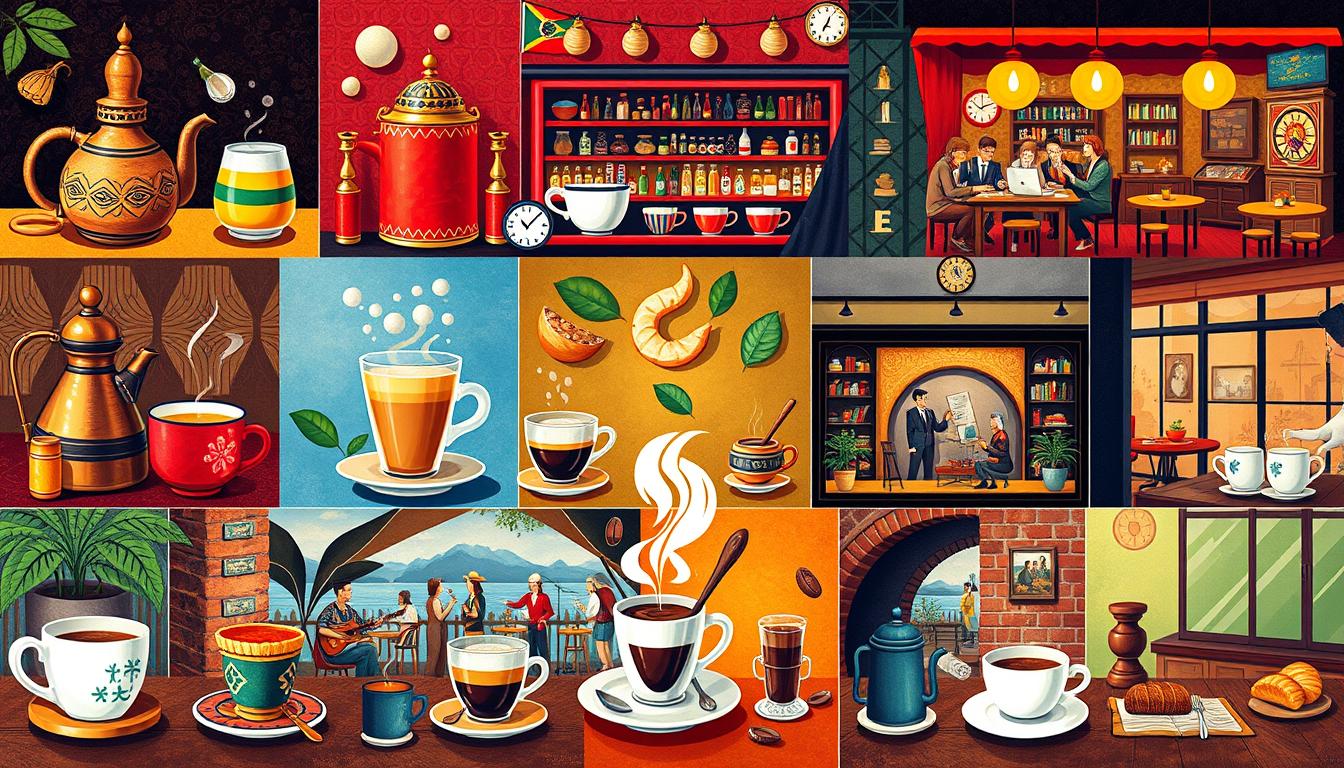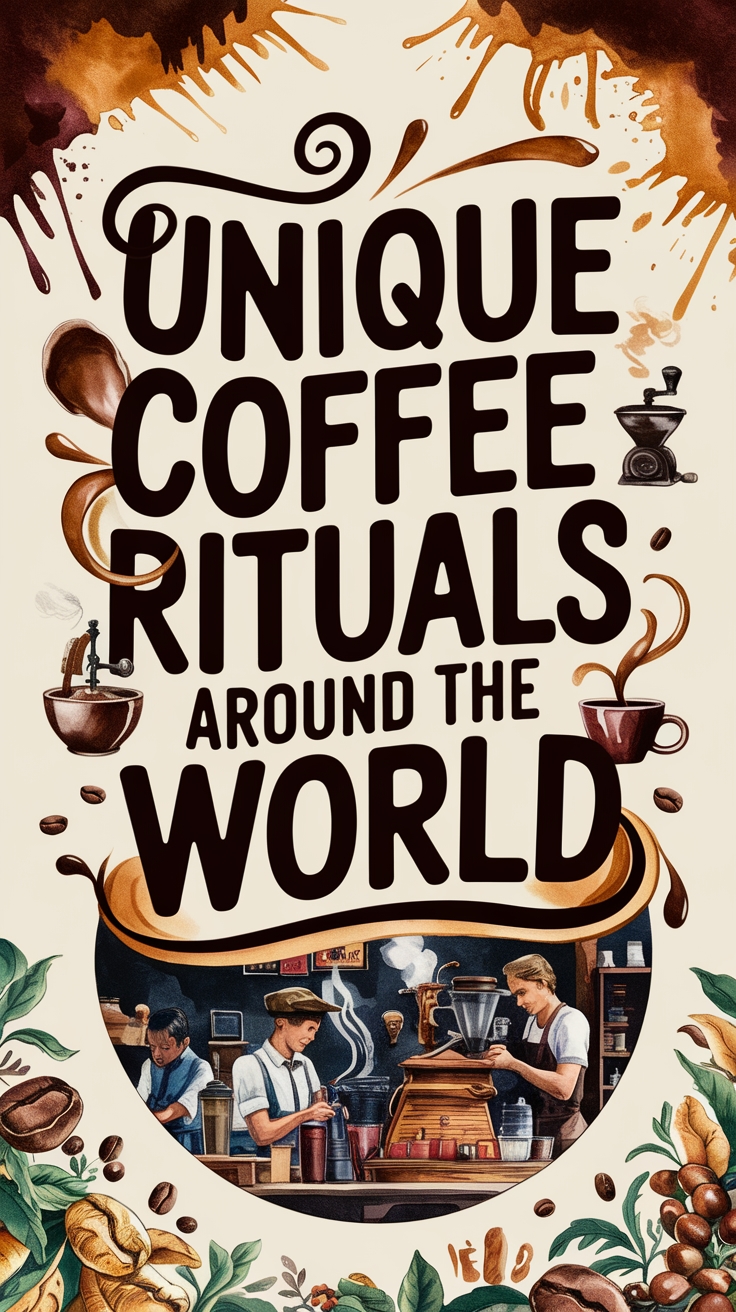Coffee is more than just a drink; it’s a powerful way to connect cultures. It shows how different societies turn a simple drink into a deep experience. This experience is about connection, hospitality, and shared identity.
In Istanbul’s lively streets and Japan’s calm tea houses, coffee traditions shine. Each way of brewing coffee tells a story. It’s about community, communication, and cultural practices that go beyond just drinking coffee.
Our journey takes us through the world of coffee traditions. We see how societies have made coffee a meaningful social ritual. These practices show the power of coffee to connect us all through a beloved drink.
Key Takeaways
- Coffee serves as a cultural bridge across different societies
- Unique brewing methods reflect local traditions and values
- Coffee rituals strengthen social bonds and community connections
- Each culture brings distinctive preparation techniques to coffee
- Coffee ceremonies represent more than consumption – they’re cultural experiences
Ethiopian Coffee Ceremony: A Ritual of Unity
In Ethiopia, coffee is more than a drink. It’s a deep cultural tradition called “Buna.” This ritual shows how coffee customs unite people worldwide. It’s a symbol of community and connection.
The ceremony starts with green coffee beans washed and roasted over an open flame. The smell of the coffee fills the room, engaging everyone. There are three brewing rounds: Abol, Tona, and Baraka. Each round has its own spiritual meaning, like health, wealth, and blessings.
This ceremony is a well-planned social event. People gather around a clay pot called a jebena. They watch as coffee is ground and brewed with care. Elders and honored guests get the first coffee, showing respect and hierarchy.
This ritual does more than just make coffee. It brings people together. In Ethiopian homes and communities abroad, it can last hours. It’s a time for deep conversations and reconnecting. It turns coffee drinking into a shared cultural experience that celebrates unity and heritage.
Ethiopian coffee ceremonies show how a simple drink can deeply connect people. It’s a tradition of respect, warmth, and shared moments.
Turkish Coffee and Fortune Telling
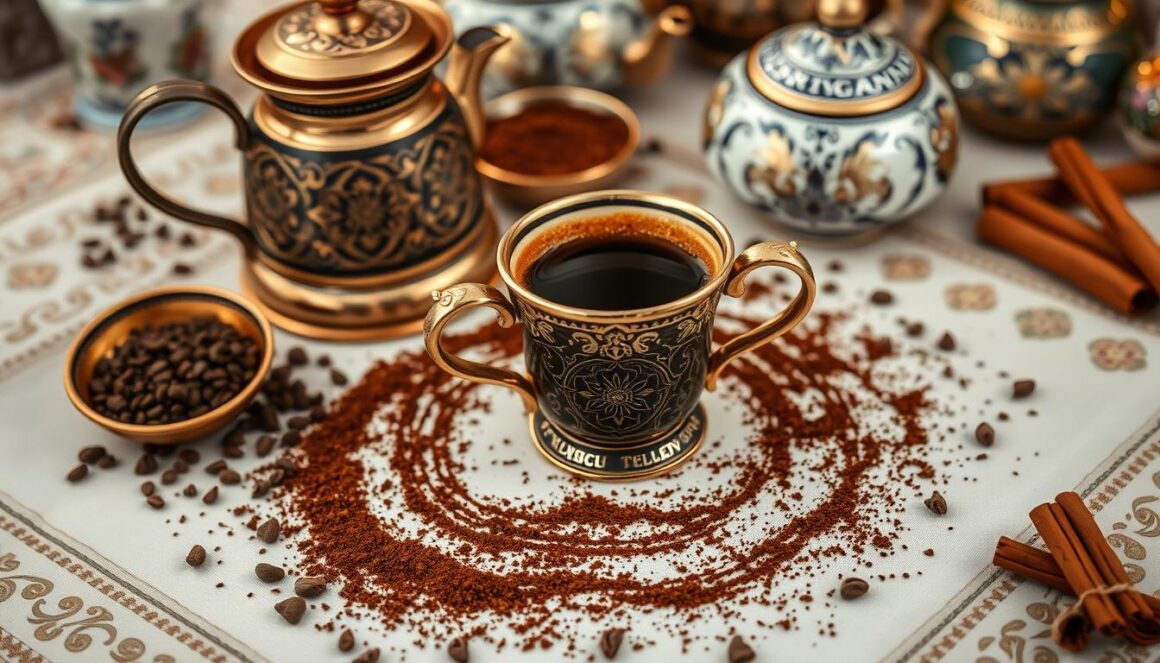
Turkish coffee is a special part of international coffee experiences. It mixes rich tradition with mystical practices. Brewed slowly in a special pot called a cezve, it’s more than a drink. It’s a cultural ritual that connects people through coffee.
The preparation is an art form. Finely ground coffee beans are simmered slowly. This creates a thick, robust drink with a rich foam. It’s served with a small piece of Turkish delight, making the experience even more special.
After drinking, a fascinating tradition starts: tasseography, or coffee ground fortune telling. Drinkers flip their cup upside down on the saucer. This lets the grounds settle and form patterns. Skilled readers then interpret these shapes, revealing insights about the drinker’s future.
UNESCO has recognized Turkish coffee as an Intangible Cultural Heritage. About 80-90% of Turkish coffee drinkers enjoy this fortune-telling ritual. It turns a simple drink into a way to connect with others across generations.
This centuries-old practice continues to enchant people. It shows how coffee can be more than a drink. It’s a way to explore culture, start conversations, and connect with others.
Japan’s Respectful Coffee Siphoning
In the world of coffee, Japan’s siphon brewing is a standout. Introduced in the 1920s, it turns coffee making into a science and art. It fascinates both coffee lovers and those who just watch.
The siphon method shows Japan’s love for precision and respect for craft. Baristas use a glass device to brew coffee, making it look like a science experiment. Hot water moves between chambers, pulling out coffee’s flavors with clarity and depth.
Japanese coffee culture makes siphon brewing more than just making a drink. Competitions like the National Siphonist Championship in Tokyo show the deep respect for this method. Baristas are praised for their skill in making perfect cups that highlight the coffee’s flavors.
This method shows Japan’s values of harmony and precision. Every step is planned, and temperatures are kept at about 200 degrees Fahrenheit. It turns coffee brewing into a ritual that honors tradition and innovation.
For those who love coffee, Japanese siphon brewing is a unique experience. It shows how a simple drink can express skill, respect, and beauty.
Swedish Coffee Break: Fika Tradition
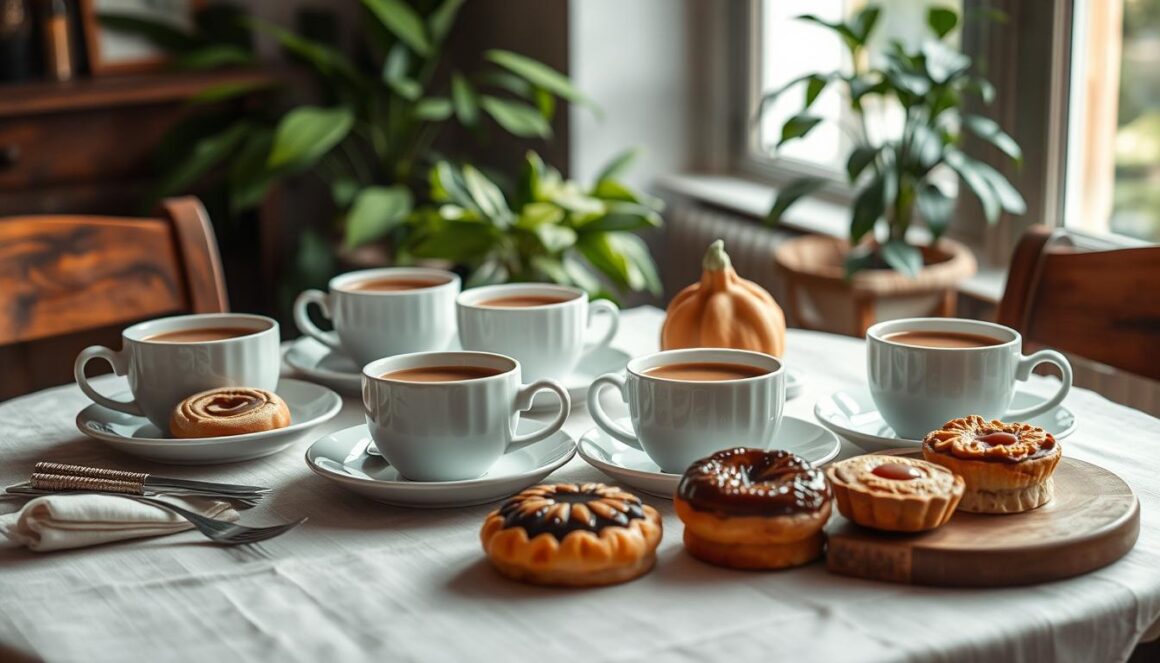
In the world of coffee, Sweden has a special tradition called fika. It’s more than just a coffee break. It’s a time to pause and connect with others. Fika is about enjoying life’s simple moments.
Swedes love strong black filter coffee with treats like cinnamon buns or cardamom rolls. They often meet with friends or family, making it a social event. Even workplaces in Sweden make time for fika, showing its importance.
Sweden is among the top coffee drinkers globally. Fika happens several times a day, but it’s even more special in summer. People enjoy it outdoors, using mismatched china and small cups.
Fika is becoming famous worldwide, thanks to social media. It shows a different way to enjoy coffee, focusing on connection and the moment.
The Bulletproof Coffee Phenomenon
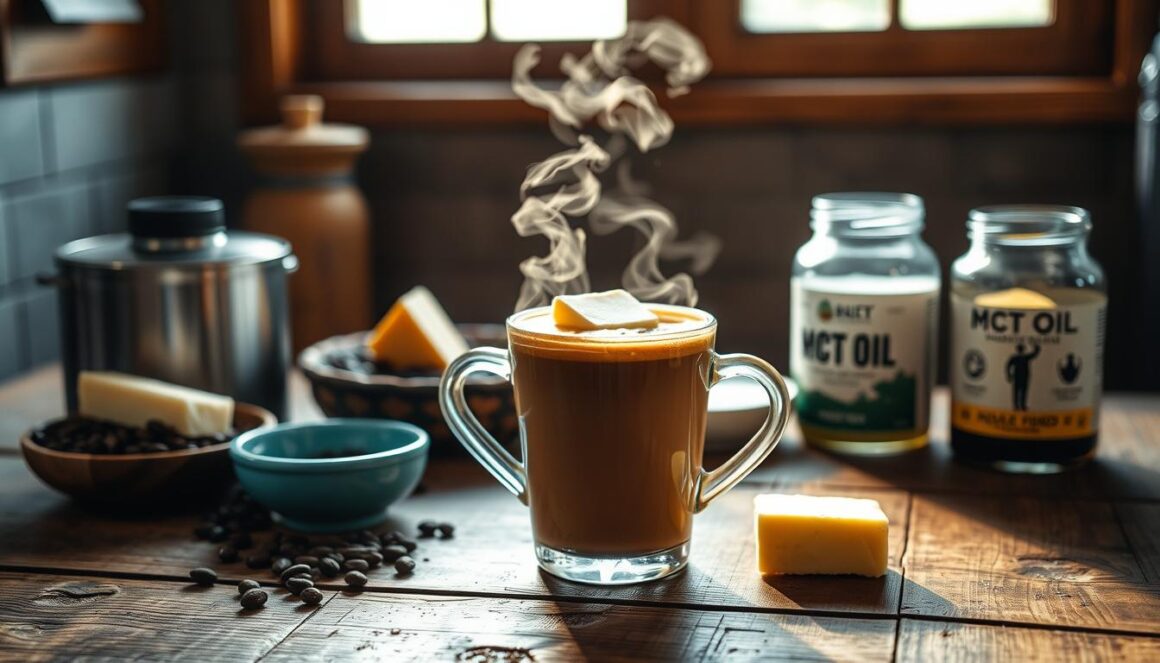
Bulletproof Coffee is a modern twist in the world of coffee. It started in Silicon Valley’s biohacking scene. This coffee mix includes high-quality beans, grass-fed butter, and MCT oil. It turns a simple coffee into a nutritional powerhouse.
This coffee tradition is different from others. It was created by Dave Asprey. It aims to give you energy, improve your brain, and maybe even help your metabolism. It’s a creamy, rich drink that’s unique among coffee lovers worldwide.
Experts have mixed opinions on Bulletproof Coffee. Some say it boosts mental clarity and gives steady energy. Others worry about its high saturated fat. Yet, it has started a global talk about nutrition, productivity, and coffee’s role in our lives.
Bulletproof Coffee is more than a drink. It’s a lifestyle choice. Tech leaders and fitness fans worldwide have adopted it. It shows that coffee is always changing, from a simple morning drink to a cultural and nutritional experience.
Cuban Coffee Ritual: Colada Sharing
Cuban coffee culture is a lively example of how coffee can bring people together. The colada tradition is more than just drinking coffee. It’s a way to connect with others through a shared moment of joy.
In Cuban communities, a colada is a special gathering. It’s served in a big cup with tiny glasses. This encourages everyone to chat and bond over the rich, sweet espresso.
Making Cuban coffee, or Café Cubano, is an art. Baristas mix espresso with sugar to create a thick, sweet foam called ‘espumita’. This makes Cuban coffee stand out from others, showing off its unique culture.
Miami’s Cuban community has kept this coffee tradition alive. They have ‘ventanitas’—small windows where coffee is made and shared. These spots keep the Cuban coffee culture alive, making it a symbol of community.
Cuban coffee is more than a drink. It’s about sharing, connecting, and celebrating culture. It shows how one small cup can make a big difference in our lives.
Italian Espresso Culture: Strict Rules
In the world of coffee, Italian espresso culture is a top example of tradition and precision. Enjoying espresso in Italy is more than just drinking coffee. It’s a social experience that shows off the country’s identity and love for food.
Italian coffee bars are all about the details. They follow the 5 M’s: Miscela (blend), Macchina (machine), Macinino (grinder), Manutenzione (maintenance), and Mano (barista’s skill). This ensures every espresso is perfect.
In Italy, coffee has its own rules. Drinking cappuccino after 11:00 am is seen as wrong. People usually stand at the bar and quickly drink their espresso. This makes coffee a fast, shared moment. An espresso costs about one euro, showing it’s for everyone.
The Italian way of enjoying coffee is not just about the drink. It’s about quality, connection, and being precise. This approach has inspired coffee lovers all over the world.
Conclusion: Unique Coffee Rituals Around the World
The world of coffee is full of special rituals that go beyond just drinking. Every day, over 2.25 billion cups of coffee are enjoyed globally. These customs are more than a drink; they are a way to share culture and connect with others.
In Ethiopia, the coffee ceremony is a big deal. It brings people together. In Japan, making coffee is an art form. These rituals show how coffee can unite people from all over.
These coffee traditions show us how important they are in different cultures. In Turkey, coffee is about spiritual connection. In Italy, it’s about socializing. Coffee brings people together, making it a universal symbol of hospitality.
As cultures change, these coffee traditions stay true to their roots. In Ethiopia, Japan, and Vietnam, coffee is celebrated in new ways. It connects people across generations and places, telling a story of tradition and innovation.
Looking into these coffee rituals shows us the beauty of human culture. Each cup has a story, showing how coffee can bring us together. It celebrates our differences and our shared experiences. Coffee continues to inspire and unite us, one cup at a time.
FAQ
What makes the Ethiopian coffee ceremony so special?
The Ethiopian coffee ceremony is more than just making coffee. It’s a deep social ritual. It involves roasting beans, grinding them by hand, and brewing three rounds. This ceremony shows community, hospitality, and cultural heritage, making coffee a sensory and social experience.
How does Turkish coffee fortune-telling (tasseography) work?
Tasseography is an ancient art of reading coffee grounds. After drinking Turkish coffee, the cup is turned upside down. Fortune-tellers look at symbols and patterns in the grounds. They believe these can reveal insights about a person’s life.
What makes Japanese siphon coffee brewing unique?
Japanese siphon coffee brewing is precise and beautiful. It uses a vacuum technique to make clean, flavorful coffee. This method shows Japanese values of precision and harmony, blending tradition and innovation.
What exactly is Swedish fika?
Fika is more than a coffee break. It’s a Swedish tradition of enjoying coffee and pastries. It’s about taking time to appreciate life and connect with others. Fika is key to Swedish culture, showing the importance of balance and community.
What is Bulletproof Coffee and why is it popular?
Bulletproof Coffee is a mix of coffee, butter, and MCT oil. It started in Silicon Valley and claims to boost energy and focus. It’s a modern take on nutrition and productivity, reflecting changing views on diet and coffee.
What is a colada in Cuban coffee culture?
A colada is a strong Cuban espresso shared with friends and family. It shows Cuban values of community and generosity. Drinking a colada is a way to bond and share moments, beyond just drinking coffee.
What are the key rules of Italian espresso culture?
Italian espresso culture has strict rules. Espresso is drunk quickly at a bar, with precise preparation. There are social norms, like not having cappuccinos after breakfast. It’s about quality, tradition, and socializing over coffee.
Are these coffee rituals relevant today?
Yes! These rituals adapt to modern life but remain important. They help preserve culture, foster social connections, and celebrate shared experiences. Coffee’s power to unite people across cultures is timeless.

